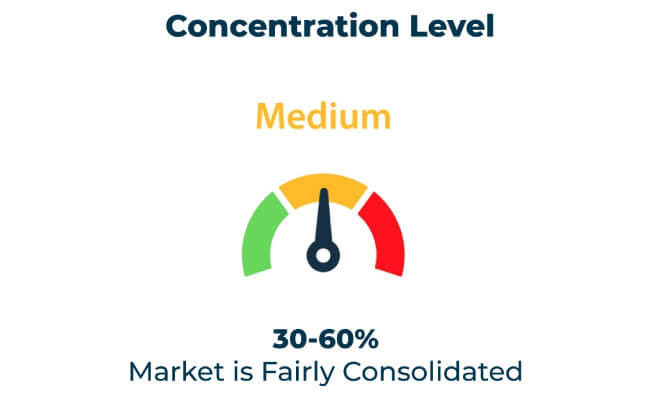The respiratory inhaler devices market in Germany is projected to grow robustly, reaching USD 1,952.5 million by 2035, with a compound annual growth rate (CAGR) of 1.6% from 2025 to 2035. There is a rising awareness of pulmonary health, owing to an increase in a number of people suffering from chronic obstructive pulmonary disorder.
| Attributes | Details |
|---|---|
| Projected Value by 2035 | USD 1,952.5 million |
| CAGR during the period 2025 to 2035 | 1.6% |
The government has taken certain initiatives to raise awareness of the disease, which in turn encourages the country’s population to visit healthcare facilities. For these, the Advanced healthcare infrastructure in Germany, coupled with a high prevalence of respiratory diseases such as asthma and COPD, drives significant demand for inhaler devices.
Germany is also emphasizing digital healthcare solutions, which further supports the growing adoption of smart inhaler technologies. The demand for portable and user-friendly inhalers among institutional and retail consumers further underscores the market's evolving dynamics.
| Industry | Growth Trends |
|---|---|
| Pharmaceuticals | Strong focus on developing digital and eco-friendly inhalation therapies. |
| Retail | Expansion of e-commerce platforms offering a diverse range of respiratory devices. |
| Healthcare Providers | Increased adoption of advanced inhalers in hospitals and outpatient facilities. |
Germany's respiratory inhaler devices market is moderately consolidated, with dominant multinational corporations complemented by local manufacturers.

| vendor Tier | Tier 1 |
|---|---|
| Key Vendors | Boehringer Ingelheim, AstraZeneca |
| Market Share (%) | 60% |
| Description | Market leaders with innovative inhaler solutions and strong distribution networks |
| vendor Tier | Tier 2 |
|---|---|
| Key Vendors | GSK, Philips Healthcare |
| Market Share (%) | 30% |
| Description | Prominent players offering diverse portfolios of respiratory care products. |
| vendor Tier | Tier 1 |
|---|---|
| Key Vendors | Local brands and niche players |
| Market Share (%) | 10% |
| Description |
Focus on cost-effective inhalers and specialized products. |
The German respiratory inhaler devices market is expected to experience sustainable growth throughout 2035, driven by technological advancements, eco-friendly initiatives, and increasing consumer awareness of pulmonary health. Digital inhalers will enhance patient outcomes by providing personalized care and facilitating adherence tracking.
Germany will continue to drive product innovation, focusing on reducing carbon emissions from healthcare devices. Smart inhalers and alternative propellant technologies are expected to dominate, in line with the country's green initiatives. The retail sales channel, particularly e-commerce, is expected to experience significant growth, offering convenience and broader access to respiratory devices.
Germany-based respiratory inhaler devices market holds immense growth potential in the backdrop of innovation, environmental responsibility, and increasing health awareness. Companies that have a keen interest in providing green technologies and digital solutions are expected to become market leaders. Strong government support, combined with a proactive healthcare system, will enable the market to grow sustainably over the next decade.
By 2025 to 2035 , the Germany respiratory inhaler device market is expected to grow at a CAGR of 1.6%.
By 2035, the sales value of the Germany respiratory inhaler device industry is expected to reach is USD 1919.8 million.
Key factors propelling the Germany respiratory inhaler devices market include Increasing Prevalence of Respiratory Diseases, Advancements in Inhaler Technology, Growing Healthcare Awareness and Accessibility, Government Initiatives and Funding, Aging Population, Rising Pollution Levels .
The key players operating in the global respiratory inhaler devices market include Massimo Corporation, Teleflex Incorporated, Fisher & Paykel Healthcare Limited, ResMed Inc., Hamilton Medical AG, Medtronic plc., Koninklijke Philips N.V., Smith’s Medical, General Electric Healthcare Limited, Drägerwerk AG & Co. KGaA, Inogen Inc.






Full Research Suite comprises of:
Market outlook & trends analysis
Interviews & case studies
Strategic recommendations
Vendor profiles & capabilities analysis
5-year forecasts
8 regions and 60+ country-level data splits
Market segment data splits
12 months of continuous data updates
DELIVERED AS:
PDF EXCEL ONLINE
Germany Casino Tourism Market Size and Share Forecast Outlook 2025 to 2035
Germany Sea Water Pumps Market Analysis - Size, Share, & Forecast Outlook 2025 to 2035
Germany Automotive Turbocharger Market Growth – Trends, Demand & Innovations 2025–2035
Germany Yeast Market Outlook – Share, Growth & Forecast 2025–2035
Germany Green and Bio-based Polyol Market Report – Trends, Demand & Industry Forecast 2025–2035
Germany Natural Food Color Market Growth – Trends, Demand & Innovations 2025–2035
Germany Coated Fabrics Market Report – Trends, Demand & Industry Forecast 2025–2035
Germany Barite Market Report – Trends, Demand & Industry Forecast 2025–2035
Germany Compact Construction Equipment Market Outlook – Share, Growth & Forecast 2025–2035
Germany Flare Gas Recovery System Market Trends – Growth, Demand & Forecast 2025–2035
Germany Electric Golf Cart Market Insights – Trends, Demand & Growth 2025–2035
Germany Active Spoiler Market Analysis – Share, Growth & Forecast 2025-2035
Germany Magnetic Separator Market Outlook – Growth, Trends & Forecast 2025-2035
Germany 1,4-Diisopropylbenzene Market Analysis – Demand, Growth & Forecast 2025-2035
Germany Centrifugal Pumps Market Insights – Size, Share & Industry Growth 2025-2035
Germany Travel Agency Services Market Insights – Trends, Demand & Growth 2025-2035
Germany Sports Tourism Market Trends – Size, Demand & Forecast 2025-2035
Germany Power Tools Market Growth – Trends, Demand & Forecast 2025-2035
Germany Mountain and Ski Resort Market Analysis – Size, Trends & Growth 2025-2035
Germany Outbound Travel Market Report – Size, Trends & Innovations 2025-2035

Thank you!
You will receive an email from our Business Development Manager. Please be sure to check your SPAM/JUNK folder too.
Chat With
MaRIA